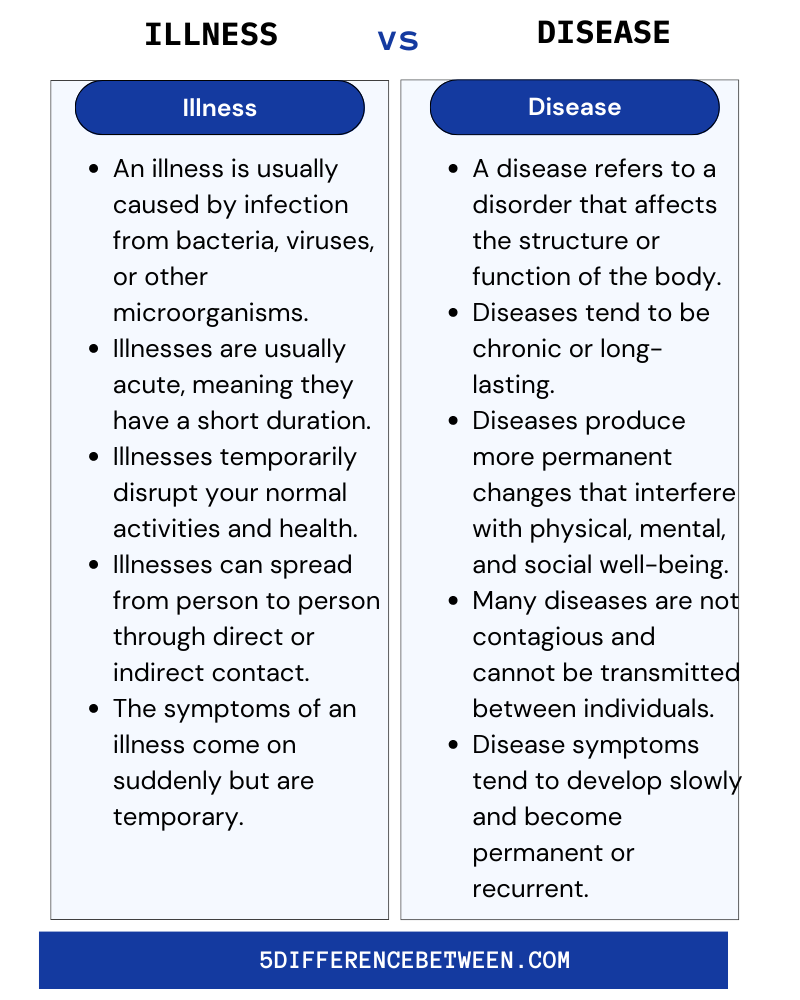The key difference between an illness and a disease is that illnesses are typically short-term and curable, while diseases are long-lasting or chronic medical conditions. Diseases are often life-changing and require ongoing treatment and management. But whether you have an illness or disease, focus on maintaining a healthy lifestyle with good self-care habits.
What Qualifies as an Illness?
So what exactly counts as an illness? In short, an illness refers to any condition that negatively impacts your health and well-being. It can be acute, like the flu, or chronic, like diabetes. Common symptoms of an illness include:
- Pain, aches, or discomfort
- Nausea or vomiting
- Fatigue and low energy
- Difficulty breathing
- Fever or chills
- Coughing or wheezing
If you’re experiencing these symptoms, you likely have an illness of some kind. The good news is many common illnesses are mild to moderate and will pass on their own or with basic self-care. However, some illnesses can be more serious or long-lasting.
When suffering from an illness, it’s a good idea to stay home and rest as much as possible. Get extra sleep, drink plenty of fluids, and consider over-the-counter medications to relieve symptoms like pain relievers, decongestants, or cough suppressants. If symptoms worsen or last more than a few days, see your doc ASAP. They can determine if it’s a virus, bacteria, or other issue and may prescribe medication if needed.
What Constitutes a Disease?
A disease is a specific unusual condition that negatively affects the structure or function of all or part of an organism. Unlike an illness, which refers to how a person feels, a disease refers to the actual medical problem.
It’s caused by a pathogen like a virus, bacteria, or parasite. For example, the flu is actually caused by the influenza virus. Malaria is actually caused by a parasite called Plasmodium.
Also Read > Difference Between Hearing and Listening
It involves a structural or functional change, like a genetic mutation. Cancer, for instance, involves changes in a person’s DNA that allow cells to grow out of control. Diabetes involves problems with the production of insulin. It has a specific set of signs and symptoms. Doctors use symptoms like coughing, fever, and fatigue to diagnose diseases like the common cold, pneumonia, or the flu.
It often has a predictable course. Doctors know how diseases like chickenpox, measles, and mononucleosis typically progress and the types of complications that may arise. There are established treatments. Antibiotics treat bacterial infections. Vaccines prevent diseases like polio, mumps, and rubella. Surgery removes cancerous tumours. Medications help manage chronic diseases such as high blood pressure and diabetes.
In summary, while you may feel unwell when you have an illness, a disease refers to the actual underlying medical issue that’s disrupting your health. Diagnosing and properly treating diseases is key to helping people feel their best and live life fully.
Illness Vs Disease
An illness and a disease are not one and the same, although the terms are often used interchangeably. There are some key differences between these two health conditions:

While illness and disease are not interchangeable terms, they are related. An untreated or improperly managed illness can sometimes lead to chronic disease over time. But with prompt diagnosis and treatment, many illnesses and diseases can be cured or well-controlled.





